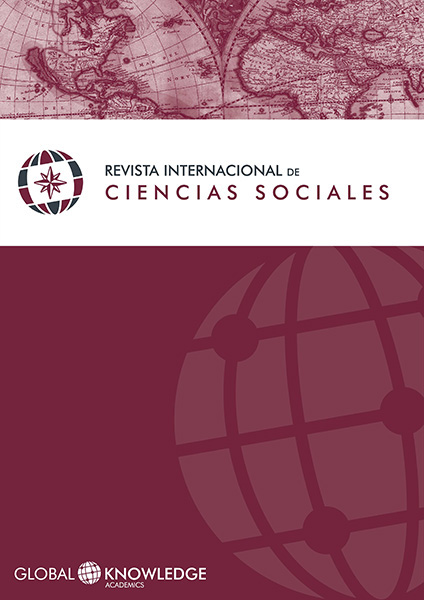A Gender Perspective: a Intersubjectivity, Embodied Consciousness and Corporeality
DOI:
https://doi.org/10.37467/gka-revsocial.v4.796Keywords:
Gender, Embodied Consciousness, CorporealityAbstract
This essay is part of a reflection whose purpose is to discuss and clarify some points and tensions around gender issues from the perspective of embodied consciousness, corporeality and temporality. The texts to be discussed for this purpose are the authors Edgar Morin: Introduction to Complex Thought (1994) and The Mind Sorted Bien (2001); Jacques Luc Nancy, Community DOA (2000) and Merleau-Ponty (1975) Phenomenology of Perception, authors who have allowed a glimpse of new theoretical contributions to gender. The challenge arises from the Philosophical Anthropology is trying to understand the “human phenomenon”, from a metaphysical perspective, according to this conception, the human being is the result of what he does to himself in his relationship with nature. To start this reflection, it is necessary to recognize that it arises from the Phenomenology, which is also considered a philosophy for which the world is always “already there” before reflection as an inalienable presence and allows to account for the space, time and "lived" world. Hurssel the theorist who founded this movement says: I'm not the result or crosslinking of the many coincidences that determine my body or my “psyche” but rather, all I know the world, I know from a prospect or mine experience the world without which the symbols of science would not want to say anything. (Husserl, 1913, p. 369-370)
Downloads
Global Statistics ℹ️
|
503
Views
|
315
Downloads
|
|
818
Total
|
|
References
Apple, M. (1994). Text and Context: The State and Gender in Educational Policy. Curriculum Inquiry, 24 (3), pp. 349-359. DOI: https://doi.org/10.1080/03626784.1994.11075428
Arent, H. (2005). La condición humana. México: Paidós.
Bourdieu, P. (1980). Le Sens pratique. París: Editions de minuit.
Bourdieu, P. (1985). Language and symbolic power. Cambridge: Polity Press.
Bourdieu, P. (1988). Social Space and Symbolic Power. Sociological Theory, 7 (1). DOI: https://doi.org/10.2307/202060
Beauvoir, S. (1970). El Segundo Sexo. Buenos Aires: Editorial Siglo XX.
Butler, J. (1982). Variations on Sex and Gender: Beauvoir, Wittlg and Foucault. Feminism as Cri, Tiq/Ut. Minnesota, USA: University of Minnesota.
Foucault, M. (1975). Vigilar y castigar. Michel Foucault habla del soldado y de su ‘retórica corporal de honor’. Discipline and Punish (pp. 135-169). México: Editorial Siglo XXI.
Foucault, M. (1979). Microfísica del poder. Madrid: Las Ediciones de La Piqueta.
Foucault, M. ( 1978). Historia de la Sexualidad . Madrid: Siglo XXI.
Foucault, M. (1996). Hermenéutica del sujeto. Buenos Aires: Altamira.
Garver, N. (1977). What Violence Is. Social Ethics, Morality and Social Policy . Nueva York: McGraw Hill.
Heidegger, M. (2000). Carta sobre el Humanismo. Madrid: Ed. Alianza.
Husserl, E. (1986). Ideas Relativas a una Fenomenología Pura y una Filosofía Fenomenológica. México: FCE.
Lamas, M. (2000). El género. La construcción cultural de la diferencia sexual. México: UNAM.
Merleau-Ponty, M. (1975). Fenomenología de la percepción. Barcelona: Rigsa.
Morín, E . (1994). Introducción al pensamiento Complejo. España: Gedisa.
Morín, E . (1999). Los sietes saberes necesarios para la educación del futuro. Francia: UNESCO.
Morín, E . (2001). La Mente Bien Ordenada. España: Seix Barral.
Morín, E . (2001). El pensamiento Complejo. España: Seix Barral.
Nancy, J. L. (2000). La Comunidad inoperante. Santiago de Chile: LOM Ediciones
Olavarría, J. (2001). Identidades Masculina/s, violencia de género y cultura de la Paz. Antecedentes para el debate en América Latina . Chile: Flacso.
Lamas, M. (1995). Cuerpo e identidad. En Arango, L. M. León y M. Viveros (comp.), Género e identidad. Ensayos sobre lo Femenino y lo masculino. Bogotá: Tercer mundo Editores.
Scott, J. (1990). Gender: A Useful Category of Historical Analysis. American Historical Review, 91 (5), pp. 3-24. DOI: https://doi.org/10.2307/1864376
Varela, F. (2000). El Fenómeno de la Vida. Santiago de Chile: Dolmen Ediciones.
Weber, M. (1922). Estado y Sociedad. México: Fondo de Cultura Económica.
Weedon, C. (1987). Feminist practice and Postestructuralist theory. Oxford: Basil Blackwell.
Downloads
Published
How to Cite
Issue
Section
License
Those authors who publish in this journal accept the following terms:
-
Authors retain copyright.
-
Authors transfer to the journal the right of first publication. The journal also owns the publishing rights.
-
All published contents are governed by an Attribution-NoDerivatives 4.0 International License.
Access the informative version and legal text of the license. By virtue of this, third parties are allowed to use what is published as long as they mention the authorship of the work and the first publication in this journal. If you transform the material, you may not distribute the modified work. -
Authors may make other independent and additional contractual arrangements for non-exclusive distribution of the version of the article published in this journal (e.g., inclusion in an institutional repository or publication in a book) as long as they clearly indicate that the work was first published in this journal.
- Authors are allowed and recommended to publish their work on the Internet (for example on institutional and personal websites), following the publication of, and referencing the journal, as this could lead to constructive exchanges and a more extensive and quick circulation of published works (see The Effect of Open Access).













